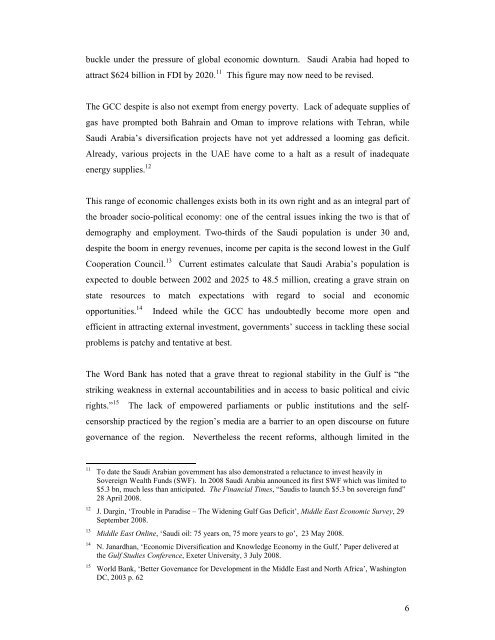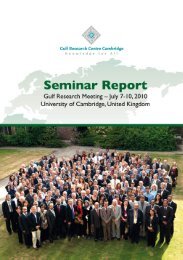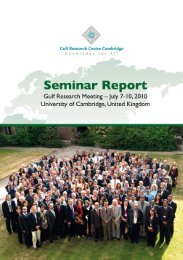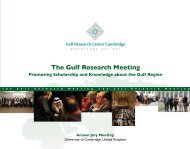Gulf Research Meeting 2010 - Gulf Africa Investment Conference
Gulf Research Meeting 2010 - Gulf Africa Investment Conference
Gulf Research Meeting 2010 - Gulf Africa Investment Conference
Create successful ePaper yourself
Turn your PDF publications into a flip-book with our unique Google optimized e-Paper software.
uckle under the pressure of global economic downturn. Saudi Arabia had hoped to<br />
attract $624 billion in FDI by 2020. 11 This figure may now need to be revised.<br />
The GCC despite is also not exempt from energy poverty. Lack of adequate supplies of<br />
gas have prompted both Bahrain and Oman to improve relations with Tehran, while<br />
Saudi Arabia’s diversification projects have not yet addressed a looming gas deficit.<br />
Already, various projects in the UAE have come to a halt as a result of inadequate<br />
energy supplies. 12<br />
This range of economic challenges exists both in its own right and as an integral part of<br />
the broader socio-political economy: one of the central issues inking the two is that of<br />
demography and employment. Two-thirds of the Saudi population is under 30 and,<br />
despite the boom in energy revenues, income per capita is the second lowest in the <strong>Gulf</strong><br />
Cooperation Council. 13 Current estimates calculate that Saudi Arabia’s population is<br />
expected to double between 2002 and 2025 to 48.5 million, creating a grave strain on<br />
state resources to match expectations with regard to social and economic<br />
opportunities. 14 Indeed while the GCC has undoubtedly become more open and<br />
efficient in attracting external investment, governments’ success in tackling these social<br />
problems is patchy and tentative at best.<br />
The Word Bank has noted that a grave threat to regional stability in the <strong>Gulf</strong> is “the<br />
striking weakness in external accountabilities and in access to basic political and civic<br />
rights.” 15 The lack of empowered parliaments or public institutions and the selfcensorship<br />
practiced by the region’s media are a barrier to an open discourse on future<br />
governance of the region. Nevertheless the recent reforms, although limited in the<br />
11 To date the Saudi Arabian government has also demonstrated a reluctance to invest heavily in<br />
Sovereign Wealth Funds (SWF). In 2008 Saudi Arabia announced its first SWF which was limited to<br />
$5.3 bn, much less than anticipated. The Financial Times, “Saudis to launch $5.3 bn sovereign fund”<br />
28 April 2008.<br />
12<br />
J. Dargin, ‘Trouble in Paradise – The Widening <strong>Gulf</strong> Gas Deficit’, Middle East Economic Survey, 29<br />
September 2008.<br />
13 Middle East Online, ‘Saudi oil: 75 years on, 75 more years to go’, 23 May 2008.<br />
14 N. Janardhan, ‘Economic Diversification and Knowledge Economy in the <strong>Gulf</strong>,’ Paper delivered at<br />
the <strong>Gulf</strong> Studies <strong>Conference</strong>, Exeter University, 3 July 2008.<br />
15<br />
World Bank, ‘Better Governance for Development in the Middle East and North <strong>Africa</strong>’, Washington<br />
DC, 2003 p. 62<br />
6





